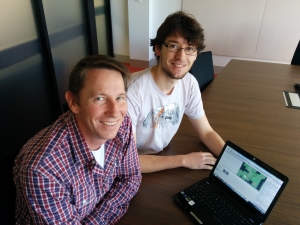Fostering altruism - a new approach to gaming
Research news
With today's children spending hours on computer games, Deakin researchers are currently working on a project that aims to harness some of that screen time by concurrently instilling some values.
Led by Senior Information Technology lecturer Dr Michael Hobbs, the IT students are working with Melbourne-based community organisation Creating a Safe Supportive Environment (CASSE) to develop a game that rewards altruistic ‘upstanding’ behaviour and helps develop conflict resolution and bullying prevention skills.
CASSE is a non-profit organisation that uses a psychoanalytic approach to creating safer, more peaceful communities. Its “Peaceful Schools Program” (PSP) focuses on facilitating and empowering students to create their own solutions to addressing schoolyard bullying, conflict and mean behaviour.
The program has been very successful - reducing bullying and increasing inclusion in all 12 Victorian schools that participated in its pilot program - and a second cohort of schools has joined the program this year.
“Screen time - what kids are watching and how much time they are spending online - is a huge issue,” said Carolyn Aston, Director of CASSE’s PSP. “Cyberbullying and the links between violent computer games and real-life violence are all too frequent headline topics.”
“However, there is also terrific potential for online gaming to be used as a means of promoting altruistic behaviour and preventing bullying,” she said.
CASSE PSP consultants, school staff and students are working with the Deakin students to develop the game, combining the fundamentals of computer game design and structure with insights into bullying identification and intervention, conflict resolution skills and caring for vulnerable members of the community.
“The working group collectively addressed how games could be used to promote greater sensitivity and empathy for others through ‘mentalisation’ - a psychological concept that describes the capacity to be aware of one’s own inner mental state and that of another. Intentional mental states (eg feelings, needs, beliefs, desires and reasons) are interpreted to help explain overt behaviour in self and other,” said Ms Aston.
Dr Hobbs said development of the game will continue through a series of workshops and Skype collaboration sessions. “We aim to have a fully operational game prototype ready to take to schools by the end of the year,” he said.
“Games are very good at providing challenges to players, usually in the context of a reward system. Our game will be team-based and encourage co-operation. At this stage, we are considering using a “Lord of the Flies”-type theme, where school kids are stranded on an island and given a series of task challenges. The players will need to put themselves in the shoes of others.”
Share this story
 Tackling bullying - Dr Michael Hobbs and IT student Luis Van Slageren.
Tackling bullying - Dr Michael Hobbs and IT student Luis Van Slageren.
